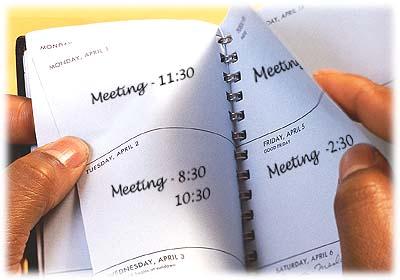 |
Meetings
really are one of the best opportunities for people to accomplish their common
goals. They allow us to share
information and ideas, deal with conflict, make decisions and solve problems. Disciplined meetings are about a mind-set. Effective meetings have many benefits, they
can be enjoyable, foster teamwork, maximise positive contributions and promote
communication.

During
meetings you have the opportunity to discuss and develop issues, make good,
shared decisions, encourage common goals and objectives, share achievements
motivate each other and also review your progress together. When meetings are effectively run, people can
innovate marvellous projects and enrich their communities. They enjoy
participating and being part of a productive team. Effective meetings are about
maximising positive contributions and fostering productive communication
between all participants.
| credit: http://37signals.com |
Although
some meetings are inevitable, even necessary, the principle is that Meetings
should be viewed sceptically from the outset, as risks to productivity. We have meetings because we think we need
them, but all too often, meetings are where work ends up going to die.
Meetings
are held to give information, to get information, to accumulate
ideas and to make decisions.
|
IMPORTANT TIPS
|
|
|
Principles
|
No meeting
should ever be more than an hour, under penalty of death
|
|
Every meeting should have a
clearly defined mission statement
|
|
|
Do your
homework before the meeting
|
|
|
Summarize to-dos at the end of
the meeting
|
|
|
Factors For Successful Meetings
|
Have an objective or purpose
|
|
Have a
structured, timed agenda
|
|
|
Preparation - and Managing the Meeting
|
|
|
An effective
Chairman
|
|
|
Concluding the meeting
|
|
|
Minutes/Action
Plan/Follow Up
|
|
|
Tips For Conducting Meetings
|
Keep an eye
on the clock
|
|
Track your number of attendees
|
|
|
Choose a
direction and stick with it
|
|
|
Define the type of meeting
you’re holding
|
|
|
Break bad
habits
|
|
Many
people regard meetings as a waste of time and money because they feel that
nothing gets decided, there has not been proper preparation, the Chairman is
ineffective, nobody really listens anyway, participants are too long winded,
the meeting goes on too long and nobody participates.
| credit: http://www.linkedin.com |
REFERENCES:
- Meetings: Where Work Goes to Die; by Jeff
Atwood, February 14, 2012; http://www.codinghorror.com/
- http://www.vacancycentre.com/
- Why Business Meetings Kill Productivity, Ilya Pozin, CEO of Open Me. Columnist for Inc, Forbes & LinkedIn. Serial Entrepreneur.; http://www.linkedin.com/

No comments:
Post a Comment